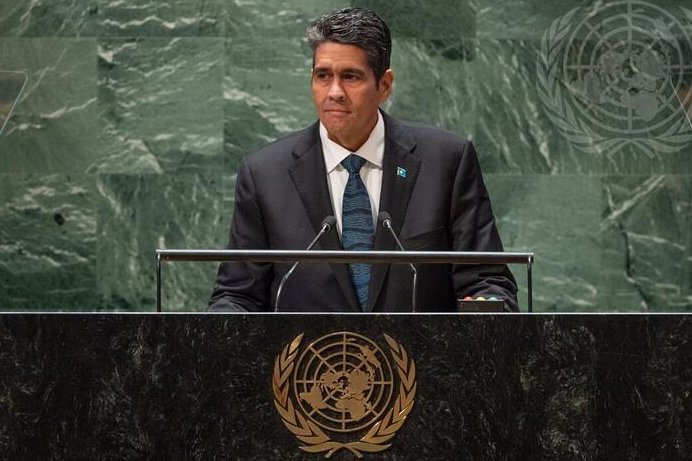Palau President and chair of the Pacific Small Island Developing States (PSIDS), Surangel Whipps Jr says the slow progress on the Sustainable Development Goals (SDGs) achieved by Small Island Developing States (SIDS) to date is an indication that losses linked to vulnerability far outweighs development gains.
He told the High-Level Political Forum on Sustainable Development in New York, there is a clear necessity for building genuine partnerships and cooperation to provide financial and technical support.
“We call for effective and durable partnerships and scaled-up climate finance that adequately recognise the context of SIDS, and respect regional and national policy coordination mechanisms and systems.
“Moreover, we call on partners to improve partnerships around data and statistics for monitoring and evaluation, digital infrastructure, and transformation, STI, sustainable and predictable financing, and capacity building,” President Whipps told the High Level Political Forum (HLPF).
He said the Pacific SIDS’ commitment to sustainable development and resilience of member countries and their peoples remain unwavering.
“However, COVID-19 and climate change have impaired and even reversed our hard-fought development gains. Our endeavors are frequently impeded by the escalating costs associated with natural disasters, the human and physical costs of climate change and our limitation and lack of access to concessional financing. Significant limitations to accessing finance hinders our abilities to allocate funds to effectively implement our development priorities, including the SAMOA Pathway and other crucial development activities.
“We support the follow-up and review of the financing for development outcomes in particular the reform of the international financial institutions to support the means of implementation of the 2030 Agenda for Sustainable Development. Nonetheless, we continue to persist in our efforts to meet the SDGs as they provide the best hope for a brighter and more sustainable future, President Whipps emphasised.
SIDS face a unique set of vulnerabilities which hinders their ability to achieve sustainable development, he said
“Structural factors, including size, remoteness, and exposure to global economic, social, political and environmental shocks impact socio economic outcomes and our ability to achieve the SDGs. These vulnerabilities were further exacerbated by the COVID-19 pandemic with many SIDS countries being particularly affected by the drop in international tourism and remittances.
“The sudden economic shock exposed the fragility of our economies and the urgent need for tailored solutions to address our unique circumstances. Thus, the call for an endorsement of a multi-dimensional vulnerability index (MVI), which will allow for the inclusion of more than just income-based criteria to assess eligibility for concessional finance, comes at the right moment, and we ask for the support of our international community on this key issue.
“We need to remind ourselves of the commitments and undertakings we made towards the full implementation of the SAMOA Pathway, and we support the call to develop a robust monitoring framework for the SAMOA Pathway aligned with the 2030 Agenda for Sustainable Development and other intergovernmental agreements, including the Sendai Framework and Paris Agreement. As these commitments reflect our shared responsibility to leave no one behind and to build a more just and equitable future for all. After all, it is of vital importance that each one of us demonstrates unwavering boldness and courage,” said President Whipps.
SOURCE: PACNEWS














